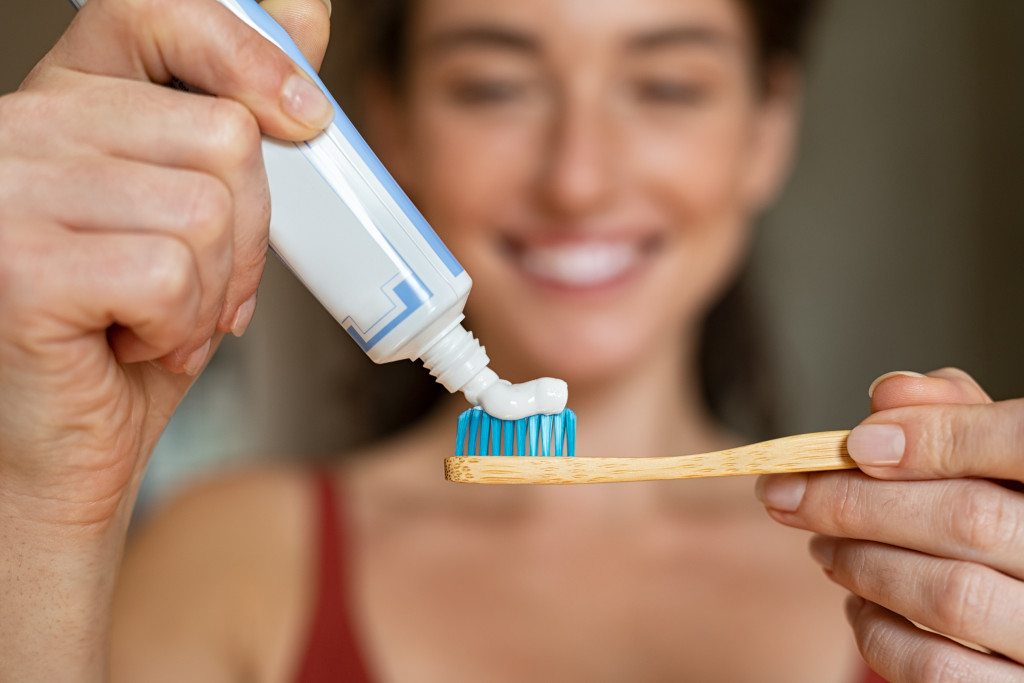Disclaimer: This website provides health information for educational purposes only and is not a substitute for professional medical advice, diagnosis, or treatment. Always seek the guidance of a qualified healthcare provider with any questions you may have.
- Brush your teeth twice daily with a soft-bristled toothbrush and fluoride toothpaste for at least two minutes each time.
- Floss regularly, using about 18 inches of dental floss wrapped around each middle finger.
- Visit your dentist regularly for comprehensive exams.
- Eat healthy foods and limit snacks high in sugar.
- Limit certain habits that affect oral health, such as smoking and chewing tobacco.
Your oral health is essential for your overall well-being. As such, it should be given the same attention and care as any other body part. Certain habits can greatly impact oral health, so here are five tips to help you look after your teeth and gums.
1. Brush Your Teeth Twice a Day
Brushing your teeth twice daily is essential to maintaining optimal oral health. Brushing your teeth with the right products can help prevent plaque, which if left untreated, may lead to tooth decay and gum disease. Make sure to use a soft-bristled toothbrush and fluoride toothpaste, as this will help keep your enamel strong and healthy. Try to brush your teeth for at least two minutes each time—that’s the amount of time it takes to remove plaque from all the surfaces of your teeth.
2. Floss Regularly
Flossing helps keep your gums clean and free from bacteria that can lead to gum disease. It’s important to floss at least once daily, ideally before bedtime. To make the most of your flossing routine, use a piece of dental floss about 18 inches long and wrap it around each middle finger, leaving about two inches between them. Gently slide the floss between each tooth, going all the way below the gum line.
3. Visit Your Dentist Regularly

A visit to your dentist should be part of your regular healthcare routine. Regular check-ups for adults can help prevent more serious dental problems in the future and help maintain good oral health over time. During a comprehensive exam, your dentist will inspect for cavities and any other signs of decay or gum disease and thoroughly clean and polish the teeth. Your dentist can also assess your overall oral health, including any changes in your mouth since your last visit.
4. Eat Healthy Foods
Eating healthy foods is critical to maintaining good oral health. Fruits and vegetables contain vitamins and minerals that help keep your teeth and gums healthy. They contain fiber which helps clean your teeth naturally when you chew them. On the other hand, sugary foods can cause plaque buildup that leads to tooth decay and gum disease. To help prevent this, try to limit snacks high in sugar and brush your teeth after eating them.
5. Limit Certain Habits That Affect Oral Health
Certain habits can be damaging to your oral health, such as smoking and chewing tobacco. Tobacco increases your risk of developing gum disease and can cause other oral cancers. Also, drinking too much alcohol can increase the risk of mouth sores, tooth damage and throat and tongue cancer. To reduce your chances of these issues occurring, it’s best to limit or avoid these habits altogether.
Here are other habits that affect your oral health;
Teeth Grinding
Teeth grinding or clenching, also known as bruxism, is another habit that can cause significant damage to your teeth. The grinding motion of the jaw can cause enamel wear, which makes them more vulnerable to decay and cavities. If you notice that you are clenching or grinding your teeth during the day or at night, it’s important to speak with your dentist about treatment options.
Nail Biting

Nail biting can be a difficult habit to break, and it can cause damage to your teeth as well. Chewing on hard objects, such as fingernails, can weaken the enamel of your teeth and make them more prone to decay. If you are struggling with this habit, consider keeping your hands occupied in other ways, such as playing with a stress ball or coloring.
Tongue Piercings
Tongue piercings can damage oral health if not properly cared for. The piercing can cause abrasions on the tongue, leading to an increased risk of infection and irritation. It’s important to speak with your dentist before getting a tongue piercing to ensure it is done safely.
Ice Chewing
Chewing on hard objects like ice cubes can harm oral health. This habit can cause chips and fractures in your teeth, which may require dental work to fix. To limit this damage, it’s best to avoid chewing on hard items altogether.
In Closing
Taking care of your oral health is essential to keep your teeth and gums healthy and strong. These five tips can help you maintain a healthy mouth for years. If you have questions or concerns about oral health, speak with your dentist immediately.




